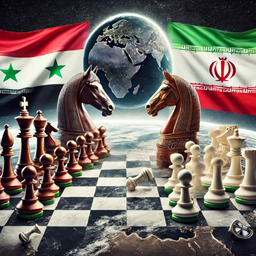by Ron Raskin

The events unfolding in the Islamic world today are comparable in significance to the transformative changes Europe experienced during the 18th and 19th centuries. Back then, the rise of nationalism began with the French Revolution, overthrowing the old feudal regime and peaking during Napoleon’s era, when his unprecedented force swept across Europe. This force was resisted only by the growing tide of Russian nationalism during the 1812 Patriotic War and eventually balanced a few decades later by German nationalism.
On December 7, 2024, the Assad regime fell. The driving force behind this revolution is the Sunni jihadist movement, Tahrir al-Sham. The future of Syria remains uncertain—whether it will face an endless civil war, an ISIS-style regime, or a new weird creature: a Moderate Radical Islamic government. Regardless of the outcome, the direction is clear.Forty-five years after Shia Islamic fundamentalism came to power in Iran, uniting much of the Shia world, Sunni radical Islam is catching up. With a significant blow dealt to Shia dominance in Syria, an old supra-tribal regime has been replaced by one grounded in the ideas of Islamic fundamentalism. This marks a pivotal moment: Sunni Islamic fundamentalism has reached new heights, while Shia influence has been pushed back—a symbolic castling move in the “game” of Islamic fundamentalism.
While the global Shia population is comparable to that of a single nation-state (~150-200 million), the Sunni population is vastly larger, around 1.5 billion, with the total Muslim population nearing 2 billion—roughly a quarter of the world’s population. The rise of such a massive supranational force carries immense destructive potential, which can only be countered by an equally powerful force or eventually tempered over time as its energy diminishes.
So, where does this leave other players, and how does it shape the situation? In terms of Sunni-Israeli relations, it’s natural to expect that countries like Saudi Arabia might prioritize internal threats over external ones, such as a weakened Iran. This shift in focus makes it less likely for them to seek closer ties with Israel or push forward with a peace deal in the near future.
When it comes to Iran and its nuclear program, there are three possible approaches:
- Do nothing and allow time to cool down Shia Islamic fundamentalism while maintaining a balance between Shia and Sunni fundamentalism. However, Iran’s rush to develop nuclear weapons could lead to a catastrophe long before this cooling-off happens.
- Launch targeted attacks on Iran’s nuclear facilities to set back their program by a few years without toppling the Ayatollah regime. This approach wouldn’t eliminate the problem since Iran’s knowledge and ability to rebuild its nuclear program would remain. While this maintains a balance between Shia and Sunni fundamentalism, as in the previous approach, it’s unclear whether this balance will actually help to cool both sides or, on the contrary, escalate tensions further.
- Remove the Ayatollah regime altogether. While this could fundamentally change the situation, it introduces a lot of uncertainty. In the medium to long term, it’s unclear whether this would bring greater security and peace to the Middle East or exacerbate Islamic fundamentalism further.
For Western democracies, the fall of Assad is likely yet another step in the constant buildup of pressure, which will force them to prepare for the future in one of two ways:
- Nationalism and self-reliance: Each country focuses on mobilizing internally, boosting nationalism to strengthen motivation and readiness to fight. However, this could lead to a decline in democratic values. This trend is already visible all-over Western democracies, in places like France, Germany, Italy, the U.S., Israel, and South Korea.
- A supranational democratic alliance: Building an alternative unified force based on democratic principles to counterbalance other rising powers.
With Sunni Islamic fundamentalism gaining momentum in Syria, there’s a growing possibility of a unified Islamic supranational entity based on these principles. The big question is whether this movement will succeed in uniting the Sunni world and posing a global threat or remain confined to a few nations, eventually cooling off and transforming into something more constructive. Nobody knows the outcome, but the game must go on…

